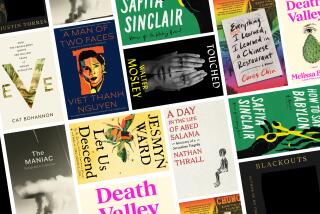NONFICTION - Jan. 24, 1993
- Share via
A SINGLE TEAR: A Family’s Persecution, Love, and Endurance in Communist China by Wu Ningkun in collaboration with Li Yikai (Atlantic Monthly Press: $21; 384 pp.). In 1958, after having been denounced as an “ultra-rightist” for (among other things) having quoted Patrick Henry’s saying “Give me liberty or give me death,” college professor Wu Ningkun found himself in a “reeducation” labor camp banging on a washbasin to frighten sparrows from the grain.” When the basin developed a hole, Wu’s wife was forced to provide another, but Wu wasn’t allowed to see her when she brought the replacement . . . and learned years later that the camp’s primitive pest-control program contributed to the subsequent famine, grain-eating insects having lost one of their natural enemies. This tale is just one of countless disquieting stories, most far worse, related by Wu in “A Single Tear” about life during the numerous political purges in China between 1953 and 1980, and they make for a powerful, terrifying read. Wu was working on a doctorate on T.S. Eliot at the University of Chicago when he received a cable asking him to return to his native land to teach English at Beijing’s Yenching University, and Wu accepted, feeling “the lure of a meaningful life in a brave new world.” It was a fateful, nearly fatal decision: Scarcely six weeks after his return in 1951 the Communist Party called for “thought reform” among intellectuals, and Wu was soon trapped in a system resembling that in Orwell’s “1984,” only worse, because it was essentially irrational. “A Single Tear” is appalling--it only skims the surface of Wu’s trials to note that his 8-year-old daughter was forced to denounce him in public--but the book’s pain is relieved to a surprising degree by the strength Wu drew from his family and, yes, even Western literature. Wu, who now lives in the United States (with his wife, collaborator and fellow sufferer, Li Yikai), often consoled himself by reading “Hamlet,” where he could see how suffering “ennobles us with the tragic grandeur of life. Each suffers and learns in his own way, but no one suffers in vain.”
More to Read
Sign up for our Book Club newsletter
Get the latest news, events and more from the Los Angeles Times Book Club, and help us get L.A. reading and talking.
You may occasionally receive promotional content from the Los Angeles Times.










